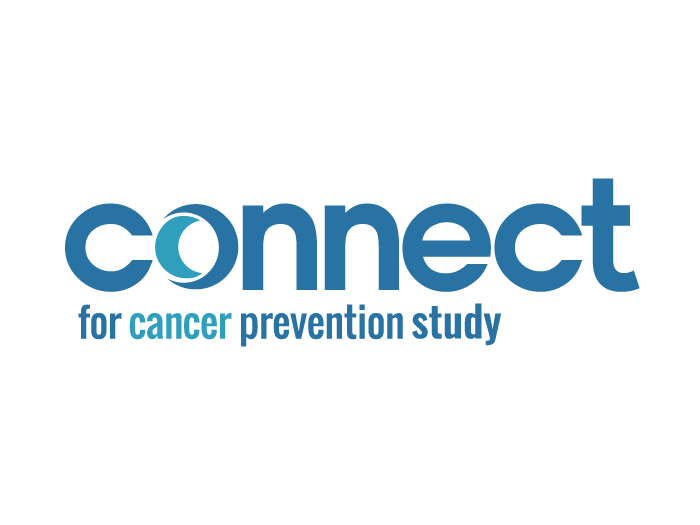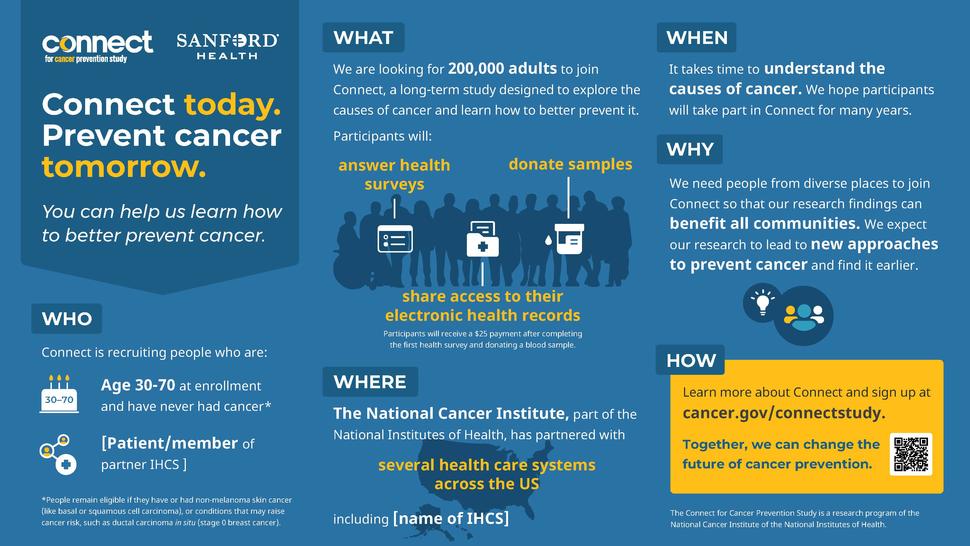Scientific Summary
The Connect for Cancer Prevention Cohort Study is a new prospective cohort of 200,000 adults in the United States designed to further investigate the etiology of cancer and its outcomes, which may inform new approaches in precision prevention and early detection. The new cohort capitalizes on research innovations to advance the field of cancer epidemiology and prevention including:
- New technologies for exposure assessment (e.g., tracking and sensors to measure behavior and environment);
- Large-scale analyses of the genome, epigenome, transcriptome, proteome, metabolome, microbiome;
- Molecular profiling of tumors and precursor lesions.
Overview of Study Setting and Design
The Connect for Cancer Prevention Study (“Connect”) is being conducted within a set of integrated health care systems to recruit 200,000 members or patients between the ages of 30-70 years with no personal history of invasive cancer (other than non-melanoma skin cancer at the time of recruitment), based on an NIH IRB-approved protocol. Recruitment efforts are aimed to promote participation of individuals from diverse backgrounds and geographic areas.
Consented participants are asked to complete an online questionnaire at baseline and periodically throughout the duration of follow-up, as well as provide access to their electronic medical records (EMRs). Blood, urine, and saliva samples are collected at baseline and repeatedly during follow-up. During follow-up, serial biological specimens as well as new specimens, including tissue specimens, are collected. Passive follow-up via tumor registries and EMRs provides outcome information for cancers and their precursors.
Communication and coordination of study activities occur electronically through a participant application (“app”) available for desktop or mobile devices. This state-of-the-art cohort is built with an efficient, flexible, and integrated infrastructure designed to make the most of modern interoperability standards in order to serve as a research resource for future generations of scientists at the NCI and across the broader scientific community.
Connect is supported by the NIH Intramural Research Program.
Initial contracts for study recruitment were awarded to the following healthcare institutions:
- Baylor Scott & White Health, Dallas, TX
- HealthPartners, Minneapolis, MN
- Henry Ford Health, Detroit, MI
- Kaiser Permanente Colorado, Denver, CO
- Kaiser Permanente Georgia, Atlanta, GA
- Kaiser Permanente Hawaii, Honolulu, HI
- Kaiser Permanente Northwest, Portland, OR
- Marshfield Clinic Health System, Marshfield, WI
- Sanford Health, Sioux Falls, SD
- University of Chicago Medical Center, Chicago, IL
Timeline
Recruitment through the partnering health care institutions was launched in 2021 and will continue through 2026. Serial questionnaires, biospecimen collection, EHR data collection, data linkages and passive follow-up activities will occur during the duration of the study, which is expected to be for decades. Visit the participant recruitment website.
Study Team
Coordinating Center for the Connect for Cancer Prevention Study
- Mia Gaudet, Ph.D., Senior Scientist
- Nicolas Wentzensen, M.D., Ph.D., M.S., Principal Investigator
Resource Sharing Principles for Research
The principles of the Connect for Cancer Prevention Study data and biospecimen sharing policy will support extensive and appropriate use of the resource, consistent with NIH policy. Safeguards for privacy and confidentiality will be in place to protect participants’ data and biospecimens. Any researchers wishing to use the resources from the cohort will need to complete an application. The process will vary for biospecimens and depend on the sensitivity of the requested data.
To improve data traceability and reproducibility of analyses and results according to FAIR (Findable, Accessible, Interoperable, Reusable) data principles, Connect data access will be granted through a cloud-hosted Connect for Cancer Prevention Data Platform. The Data Platform will facilitate access to raw and derived data, metadata, data dictionaries, and annotated code to all platform users.
All projects approved for data and sample use will be noted on the study website, including project summaries and study team descriptions.
For more information, contact Mia Gaudet.


